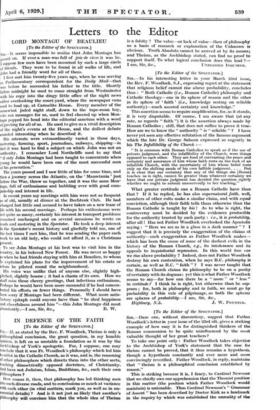[To the Editor of the SPECTATOR.] Sin,—In his interesting letter
in your March 23rd issue, the Rev. F. Woodlock, S.J., expressing regret at the statement that religious belief cannot rise above probability, concludes
thus : "Both Catholic (i.e., Roman Catholic) philosophy and Catholic theology—one in its sphere of reason and the other in its sphere of ' faith ' (i.e., knowledge resting on reliable authority)—reach assured certainty and knowledge."
This assertion seems to require amplification, for, as it stands, it is very disputable. Of course, I am aware that (at any rate, as regards "faith ") it is the assertion always made by
Roman Catholics ; still, that does not suffice to prove it true. How are we to know the" authority" is "reliable " ? I have never yet seen any effective refutation of the famous argument which the late Dr. George Salmon expressed so cogently in his The Infallibility of the Church :— "it is common with Roman Catholics to speak as if the use of private judgment, and the infallibility of the Church, were things opposed to each other. They are fond of contrasting the peace and certainty and assurance of him whose faith rests on the rock of an infallible Church, with the uncertainty of him whose belief rests only on the shifting sands of his own fallible judgment. . . . But it is clear that our certainty that any of the things she [Rome] teaches us is right, cannot be greater than whatever certainty we have that our private judgment has decided the question rightly whether we ought to submit unreservedly to her teaching."
What greater certitude can a Roman Catholic have than that ? If it be replied, he has also supernatural faith, well, members of other cults make a similar claim, and with equal conviction, although their faith tells them otherwise than the Roman Catholic is taught by his I As to who is right, the controversy must be decided by the evidences producible for the authority trusted by each party : i.e., it is probability, after all! Has not Father Woodlock overlooked the Apostolic saying : "Here we see as in a glass in a dark manner " ? I suggest that it is precisely the exaggeration of the claims of authority—such exaggeration as Father Woodlock makes— which has been the cause of some of the darkest evils in the history of the Roman Church, e.g., its intolerance and its appeals to inquisitorial repression. In this world how can we rise above probability ? Indeed, does not Father Woodlock destroy his own contention, when he says R.C. philosophy is certain, as well as R.C. " faith " ? I was never taught that the Roman Church claims its philosophy to be on a parity of certainty with its dogmas: yet this is what Father Woodlock seems to say—for how can there be a " more " or " less " in certitude.? I think he is right, but otherwise than he sup- poses ; for, both in philosophy and in faith, we must go by probability in this vale of pilgrimage, so both the spheres are spheres of probability.—I am, Sir, &c.,






































 Previous page
Previous page